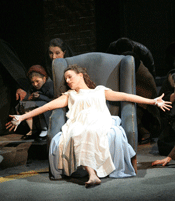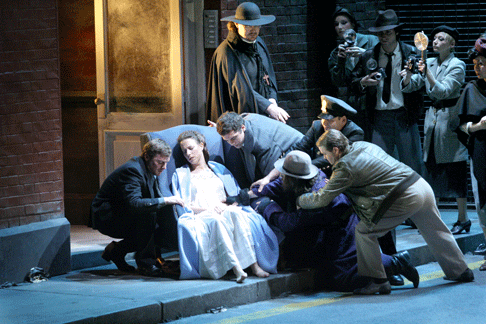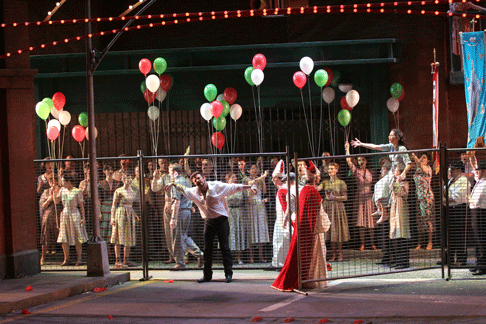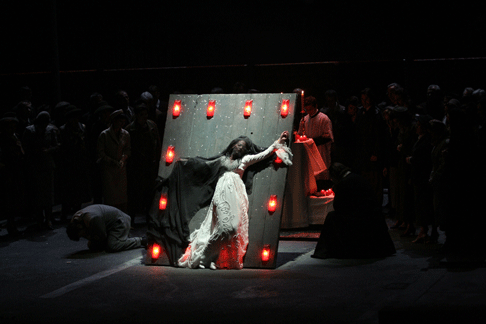Recently in Reviews
English Touring Opera are delighted to announce a season of lyric monodramas to tour nationally from October to December. The season features music for solo singer and piano by Argento, Britten, Tippett and Shostakovich with a bold and inventive approach to making opera during social distancing.
This tenth of ten Live from London concerts was in fact a recorded live performance from California. It was no less enjoyable for that, and it was also uplifting to learn that this wasn’t in fact the ‘last’ LfL event that we will be able to enjoy, courtesy of VOCES8 and their fellow vocal ensembles (more below …).
Ever since Wigmore Hall announced their superb series of autumn concerts, all streamed live and available free of charge, I’d been looking forward to this song recital by Ian Bostridge and Imogen Cooper.
The Sixteen continues its exploration of Henry Purcell’s Welcome Songs for Charles II. As with Robert King’s pioneering Purcell series begun over thirty years ago for Hyperion, Harry Christophers is recording two Welcome Songs per disc.
Although Stile Antico’s programme article for their Live from London recital introduced their selection from the many treasures of the English Renaissance in the context of the theological debates and upheavals of the Tudor and Elizabethan years, their performance was more evocative of private chamber music than of public liturgy.
In February this year, Albanian soprano Ermonela Jaho made a highly lauded debut recital at Wigmore Hall - a concert which both celebrated Opera Rara’s 50th anniversary and honoured the career of the Italian soprano Rosina Storchio (1872-1945), the star of verismo who created the title roles in Leoncavallo’s La bohème and Zazà, Mascagni’s Lodoletta and Puccini’s Madama Butterfly.
Evidently, face masks don’t stifle appreciative “Bravo!”s. And, reducing audience numbers doesn’t lower the volume of such acclamations. For, the audience at Wigmore Hall gave soprano Elizabeth Llewellyn and pianist Simon Lepper a greatly deserved warm reception and hearty response following this lunchtime recital of late-Romantic song.
Collapsology. Or, perhaps we should use the French word ‘Collapsologie’ because this is a transdisciplinary idea pretty much advocated by a series of French theorists - and apparently, mostly French theorists. It in essence focuses on the imminent collapse of modern society and all its layers - a series of escalating crises on a global scale: environmental, economic, geopolitical, governmental; the list is extensive.
For this week’s Live from London vocal recital we moved from the home of VOCES8, St Anne and St Agnes in the City of London, to Kings Place, where The Sixteen - who have been associate artists at the venue for some time - presented a programme of music and words bound together by the theme of ‘reflection’.
'Such is your divine Disposation that both you excellently understand, and royally entertaine the Exercise of Musicke.’
Amongst an avalanche of new Mahler recordings appearing at the moment (Das Lied von der Erde seems to be the most favoured, with three) this 1991 Mahler Second from the 2nd Kassel MahlerFest is one of the more interesting releases.
‘And there was war in heaven: Michael and his angels fought against the dragon; and the dragon fought and his angels, And prevailed not; neither was their place found any more in heaven … that old serpent … Satan, which deceiveth the whole world: he was cast out into the earth, and his angels were cast out with him.’
If there is one myth, it seems believed by some people today, that probably needs shattering it is that post-war recordings or performances of Wagner operas were always of exceptional quality. This 1949 Hamburg Tristan und Isolde is one of those recordings - though quite who is to blame for its many problems takes quite some unearthing.
There was never any doubt that the fifth of the twelve Met Stars Live in Concert broadcasts was going to be a palpably intense and vivid event, as well as a musically stunning and theatrically enervating experience.
‘Love’ was the theme for this Live from London performance by Apollo5. Given the complexity and diversity of that human emotion, and Apollo5’s reputation for versatility and diverse repertoire, ranging from Renaissance choral music to jazz, from contemporary classical works to popular song, it was no surprise that their programme spanned 500 years and several musical styles.
The Academy of St Martin in the Fields have titled their autumn series of eight concerts - which are taking place at 5pm and 7.30pm on two Saturdays each month at their home venue in Trafalgar Square, and being filmed for streaming the following Thursday - ‘re:connect’.
The London Symphony Orchestra opened their Autumn 2020 season with a homage to Oliver Knussen, who died at the age of 66 in July 2018. The programme traced a national musical lineage through the twentieth century, from Britten to Knussen, on to Mark-Anthony Turnage, and entwining the LSO and Rattle too.
With the Live from London digital vocal festival entering the second half of the series, the festival’s host, VOCES8, returned to their home at St Annes and St Agnes in the City of London to present a sequence of ‘Choral Dances’ - vocal music inspired by dance, embracing diverse genres from the Renaissance madrigal to swing jazz.
Just a few unison string wriggles from the opening of Mozart’s overture to Le nozze di Figaro are enough to make any opera-lover perch on the edge of their seat, in excited anticipation of the drama in music to come, so there could be no other curtain-raiser for this Gala Concert at the Royal Opera House, the latest instalment from ‘their House’ to ‘our houses’.
"Before the ending of the day, creator of all things, we pray that, with your accustomed mercy, you may watch over us."
Reviews

17 Mar 2010
The Saint of Bleecker Street, Marseilles
It takes some courage these days for an opera company to program a Gian Carlo Menotti opera. Nonetheless last month the Opéra de Marseille defied current sensibilities to give us a new production of The Saint of Bleecker Street.
In his prize winning account of music in the twentieth century The Rest is Noise New Yorker magazine critic Alex Ross accords Menotti two mentions — 1) a composer invited into Jacqueline Kennedy’s newly art responsive White House, and 2) an openly gay composer. There is no reference to Menotti’s art perhaps because musically it was a dead end street, and because Menotti’s melodrama, like the broad, latter day melodramma of Italian verismo had soon morphed first into cinematic realism and then disappeared into populist television.
Ironically Menotti did leave a significant artistic legacy. He founded the Festivals of Two Worlds first in Spoleto (1958) and then in Charlotte (1977), stalwart bastions of everything that is progressive in opera and music — a contradiction left unaddressed by Alex Ross.
The Saint of Bleecker Street premiered in 1953, rife with the baggage of the post WWII era. This was when operatic art was expected to abandon its high perches and descend onto Main Street and long runs in Broadway theaters. The Saint of Bleecker Street endured 72 performances. Its has had sporadic revivals in the U.S., notably a 1978 televised version from New York City Opera with Catherine Malfitano (once a Marseilles Butterfly) and a 2007 revival at Central City Opera directed by Mme. Malfitano.
Immigrant life in New York, the quintessential melting pot of the early and mid-century America, is the background for Menotti’s tale of alienation, a subject deeply explored in the ’50’s by artists like Edward Hopper and George Tooker. In fact Tooker’s iconic painting of alienation The Subway (1950) was the basis of the design of the original Broadway production. But Menotti complicated his take on the alienation of Italian immigrants by slathering on a lurid, melodramatic overlay of questionable religious fervor.
If nothing more Menotti’s Broadway success spawned a true masterpiece, Leonard Bernstein’s West Side Story that had its premiere in 1956, just three years later. It is a work so similar in subject that its provenance from Menotti’s little opera is blatantly obvious. But where Bernstein incorporated and expanded the musical discoveries of the twentieth century in his score Menotti kept his tonalities banale and his structures derivative of traditional sources.
The Marseilles Saint of Bleecker Street production was in the hands of British director Stephen Metcalf and British designer Jamie Vartan (neither boast American credits) who placed all the action in a courtyard between two nineteenth century oddly un-New York tenement facades. This confined space supported the scene changes uncomfortably, cramping Menotti’s facile music into a dramatic focus it could not support. Missing was the punctuation of Broadway’s quick-change theatricality, changes that in fact Menotti cleverly incorporated into his descriptive music — à la Puccini.

The Broadway style thrives on razzle-dazzle, and messieurs Menotti and Metcalf obliged with a couple of good, lively scenes — the murder of Assunta and the assumption of the Bleecker Street saint Annina — but the overall scenic rhythm was in fits and starts that missed a Broadway crescendo.
Somehow the underlying theme of incest was always gnawing, perhaps this was subtle direction by Mr. Metcalf or more likely it is latent Menotti, an active participant in the sexually giddy circles of New York’s artistic crème de la crème of that era. This thread carried a potential wallop that never materialized, impossible obviously for Main Street art of the 1950’s but not for the jaded sensibilities of this new century — a missed opportunity for a new production of this potentially shabby little shocker.

There was not an American in the cast, unusual for almost any opera production in the south of France these days. Though she gave a fine, detailed performance French soprano Karen Vourc’h did not capture a saintly rapture, or the crazed rapture of a consenting sexual victim. She was a too plain, too real Annina. Hungarian tenor Attila B. Kiss used a Broadway style voice to expound the trails of the lover Michele when a more beautiful voice could have added dimension to this role. His too careful enunciation of the American underscored the homelessness of this Marseilles production.
Armenian mezzo soprano Juliette Galstian was a good Assunta, capturing a convincing, grandly temperamental jealousy as Michele’s jilted girl friend. But her character was betrayed by the too stylish lines of her costume, in fact the period haute couture look of all womens’ costumes in this production was more important than the character they clothed (a typical complaint to the hereabouts ubiquitous costume design of Katia Duflot).

Russian bass Dmitry Ulyanov was a fish-out-of-water as the priest Don Marco, simply to young and too green to inhabit the soutane of the spiritual and temporal shepherd of Menotti’s needy Italian immigrants. The myriad of supporting roles were however well cast and uniformly effective.
British conductor Jonathan Webb played the Menotti score for all it was worth. The Friday (02/19/10) evening audience indicated by its warm but limited enthusiasm that it had not been duped into believing it had had a significant opera experience.
Michael Milenski



